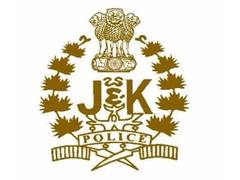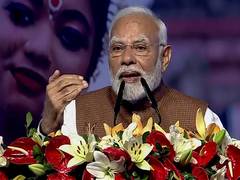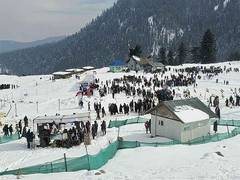VBUSS organizes Two-Day National Workshop on “Integrating Indian Philosophy, Languages, and Educational Technology” at Central University of Jammu
Jammu, 21 Oct 2024: Vidya Bharati Uchcha Shiksha Sanathan (VBUSS) organizes a two-day National Workshop titled “Integrating Indian Philosophy, Indian Languages, and Educational Technology for Developing Model Curriculum in the Discipline of Education: A Roadmap for NEP 2020” in the Department of Educational Studies, Central University of Jammu on 21-22 Oct, 2024 in collaboration with Bharatiya Bhasha Samiti (under the Ministry of Education, Government of India). The workshop aims to evolve the broad guidelines of Curriculum Development and the field of Education. This initiative aligns with the objectives of the National Education Policy (NEP) 2020, which encourages a holistic and multidisciplinary approach to Education.
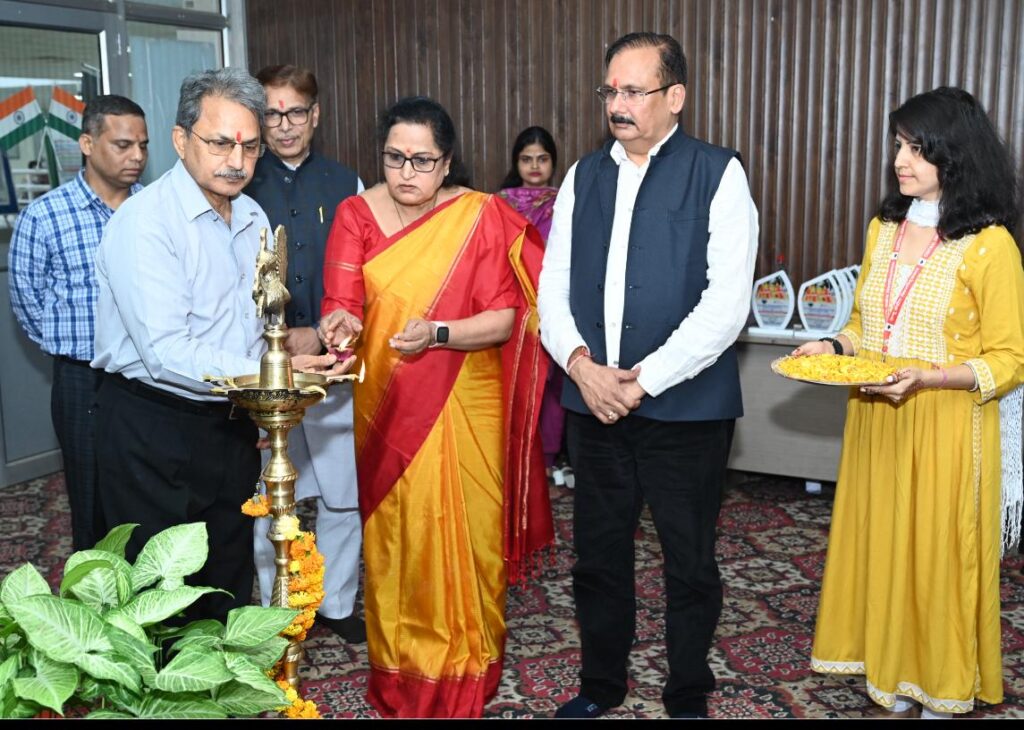
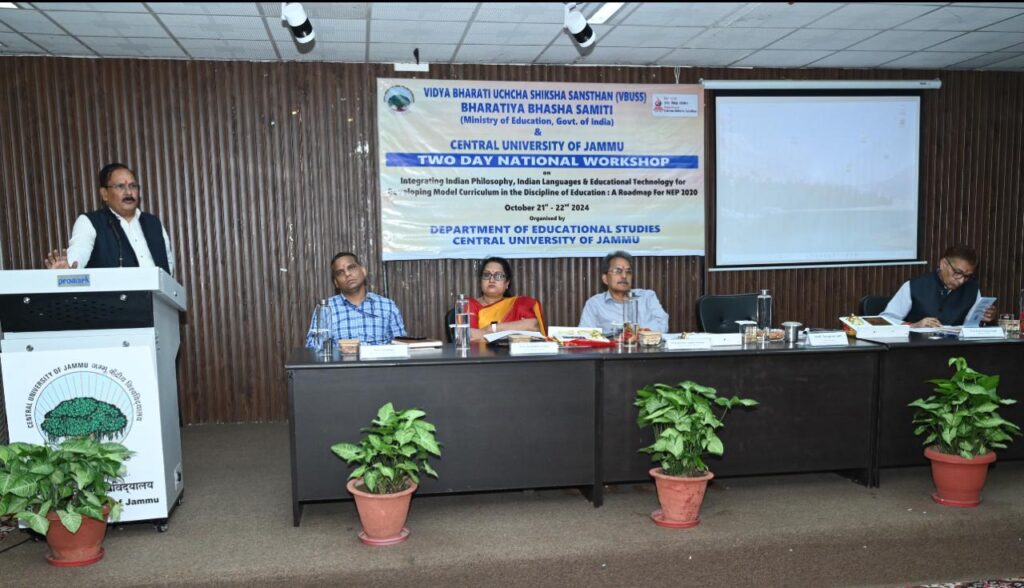
“Bharartiya Bhasha Samiti” is committed to strengthen the implementation of the three-language policy in Education by creating suitable contents, preparing teachers for multilingual education etc. Central University of Jammu also in line with the similar belief under the leadership of Prof. Sanjeev Jain works with a zeal for effective implementation of NEP-2020 and has taken a lead in organizing programs of national relevance in the campus.
Earlier Prof. Kailash Chandra Sharma, National President of VBUSS, Chief Guest of the event emphasized the importance of inclusive educational practices and the role of student bodies in shaping academic policies. He appreciated such initiatives taken by VBUSS along with different Universities in organizing informative workshops. Additionally, he stressed upon the importance of “Bharatiya Gyan and Bhartiya Bhasha” along with open mindedness in the field of Teacher Education. He also congratulated the core team of orgagnisers Prof. J.N. Baliya, Prof. Madhusudan J.V.and Prof. Surender Kumar Sharma for taking up the initiatives in this directions. The inaugural session of the workshop aimed at fostering dialogue on Educational Advancement, Innovation, and Leadership, was successfully conducted on the first day. This highly anticipated event featured esteemed resource persons who brought a wealth of knowledge and experience from diverse fields.
Prof. Sanjeev Jain, Hon’ble Vice Chancellor of Central University of Jammu (CUJ) highlighted the advancements in educational technologies and their potential for transforming traditional learning environments. He cited examples from the ancient Indian philosophies that need to be incorporated with the modern technologies considering its impact on the younger generation. He appreciated the efforts of VBUSS Unit of J&K Laddakh Prant and the core team.
Earlier, Prof. J. N. Baliya , President , VBUSS J&K Laddakh Prant welcomed all the esteemed delegates and shed light on the eight major domains created by the different departments of Education consisting of 55 members from all over the country. The session was graced by Prof. Shashi Kala Wanjari, Vice Chancellor of the National Institute of Educational Planning and Administration (NIEPA), who shared insights on educational planning and management, stressing the significance of sustainable development in education sectors. She deliberated on Indian perspectives of Education, i.e., broad and deep thinking including the idea that education must foster both inner and external development. She asserts that the purpose of education is to develop good human beings capable of rational thought and action, possessing compassion and empathy, courage and resilience.
Prof. Prem Narayan Singh, Director of the Inter University Centre for Teacher Education (IUTEC) Varanasi discussed the integration of technical education with innovative teaching methodologies to prepare students for the challenges of the future. He focused on Indian thinkers and the need for changing the dynamics of the curriculum. He also suggested the involvement of the students in developing a better curriculum model.
Prof. Asit K. Mantry, Head of the Department of Educational Studies at CUJ offered a perspective on ethical education and its integral role in fostering responsible citizenship among students. He also delivered a vote of thanks to all the dignitaries.
The session commenced with a warm welcome from the organizers, who underscored the significance of collaboration among educational leaders to tackle contemporary challenges in the academic landscape. Each resource person delivered thought-provoking presentations, inspiring discussions among participants regarding the future of education, the impact of technology, and the need for adaptive learning environments. The inaugural session was marked by engaging dialogues and a robust exchange of ideas, setting a positive tone for the subsequent sessions.
Following the opening session, a plenary discussion with the theme “National Education Policy 2020: Higher Education in Bharat” was held. Prof. Madhusudan J.V. (Head, Dept. of Education and Technology, Univ. of Hyderabad) chaired the session. Prof. Amit Kauts (Head, Dept. of Education, GNDU), and Prof. Vinay K. Dhiman (Dean, School of Applied and Basic Sciences, CUJ) served as the session’s resource persons.
There were two technical sessions conducted after lunch. The first session on “NEP 2020: Developing Curriculum and Content in the Discipline of Education Rationale & Prospects” was led by distinguished resource persons, including Prof. Deepa Kauts (Dean, SoE, GNDU), Prof. Shankar Lal Bika (Dept. of Education, CUP), and Prof. S. Mani (Prof. & Head, DEPA, TNTEU).
The second technical session was chaired by Prof. Ritu Bakshi (Professor DoES, CUJ). The speakers from the various resources covered a variety of subjects. Prof. Amit Kauts (GNDU, Amritsar) emphasized the need of “ICT in Education and Educational Technology,” Dr. Ram Singh (GDC Kathua) discussed “Value Education, Peace Education, and Environment Education,” Prof. Vishal Sood (Central University, HP) shed light on “Educational Research,” and Prof. Deepa Kauts (GNDU Amritsar) discussed “Psychological Foundations and Inclusive Education.” The sessions were designed to focus on Bharat Centric Education and to achieve the SDGs as envisioned in NEP-2020. The workshop was coordinated by Prof. Madhusudan J.V., Prof. Surender Kumar Sharma, and Prof. J.N. Baliya particularly focused on the curriculum designing, development, content writing, evaluation strategies in the field of Education and redesigning them in the light of Bhartiya Gyan Parampara.


